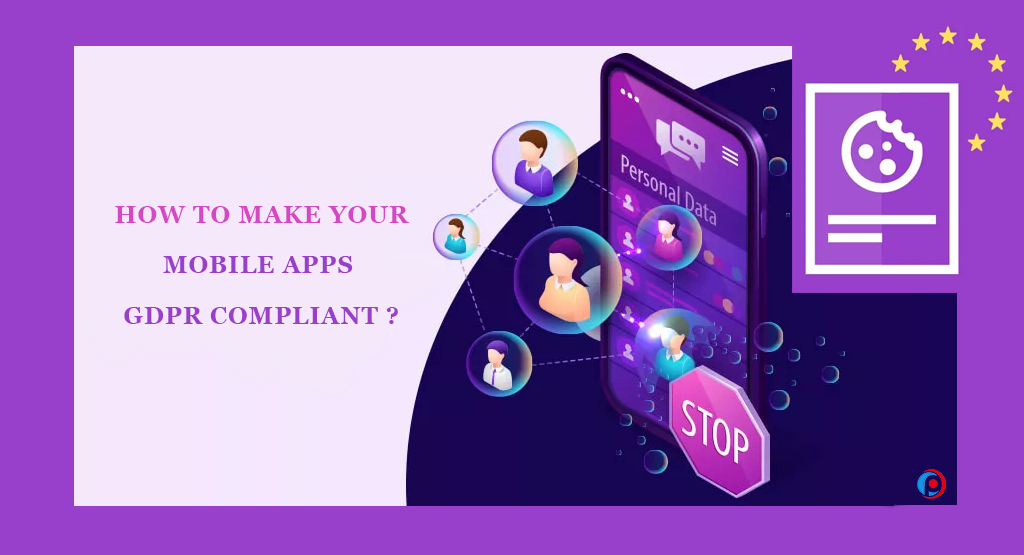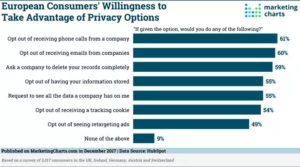The General Data Protection Regulation (GDPR) was approved by the EU Parliament on 14 April 2016 and it came into effect on 25th May 2018.
The digital industry is changing rapidly since the adoption of GDPR (General Data Protection Regulations) in the European Union. You may now be required to pay up to € 20 million or 4% of your global revenue, whichever is greater!
Even after a year, the majority of businesses are still not GDPR compliant, owing to either a gross underestimation of the severity of the situation or a lack of knowledge about how to make their business GDPR compliant.
Before we see how to make GDPR compliant mobile app, we need to see certain key terms in the law.
Key GDPR Definitions
Data subject:
A user whose data is being collected and processed.
Data Controller:
The entity that sets the purposes and methods for collecting and processing personal data is known as a Data Controller. You are a Data Controller if you own a website or mobile app and decide what data is collected, how it is acquired, and for what purpose.
Data Processor:
A data processor is a company that handles personal information on behalf of a data controller. Third-party services that access or host your customer data, such as Analytics (Google Analytics, KISSMetrics) and Cloud Services (AWS), are examples of third-party services that link into your website or app.
What do you mean by ‘Personal Data’ in context of GDPR?
Personal data is defined as any information relating to an identifiable person who can be identified directly or indirectly, particularly by reference to an identifier, as defined by GDPR.
This now denotes a broad range of information, ranging from personal information to a cookie placed on a user’s browser by an analytics monitoring programme that can be used to track website traffic.
As an app owner, you must consider not just how you collect and store personal identifiers such as names and email addresses, but also how you collect and store IP addresses and unique device IDs.
How to Make Your App GDPR Compliant?
There are some key highlights that are relevant to your mobile app and business in general that will help you ensure GDPR compliance.
Scroll down to find the 9 things you should consider in order to have a GDPR compliant mobile app.
1.Think about the data you collect from users
Some of the most common cases where you need to be alert are
• Your app collects emails and phone numbers of users
• You utilize Google Analytics or Firebase
• Your app collects payment and shipping information of users
Also, you should ensure that the third-party services that you use are GDPR compliant.
In case your app is storing user data, then make sure to use strong encryption algorithms to secure the user data to avoid a data breach. Many organizations store sensitive data such as passwords and other details in clear text, this can lead to fines under GDPR laws.
2. Analyze how you handle user data
If you are exchanging user data with third-party companies, you must inform your users of this fact and explain why you are doing so.
Apps may track user activity in order to better understand the quirks in a buyer’s behaviour. This is particularly true for e-commerce firms such as Amazon. If your app intends to continue this behaviour, GDPR requires that you first obtain the user’s permission.
You should consider explicitly disclosing the whole data receiving, management, and deletion process with the user. This would increase the user’s trust in your software.
3. Ask for permission
You’ll need data from your clients to perform activities and deliver services to them, including:
- Making bookings
- Invoicing
- Offering products according to user preferences
- Sending special offers via email and SMS
- Sending push notifications about order statuses and other information
- Shipping products
You need permission to get the data you need for all these things. Moreover, you have to explain why you need this data and what you do with it so that the process is clear for your app users.
4. Encrypt the data that users give you
You must ensure that even if someone has access to your data, they are unable to use it. You must employ the most powerful encryption algorithms, which include hashing, to store user data.
Although encryption isn’t a 100 percent guarantee of data security because hackers have found ways to circumvent it, storing information in plain text gives your company no protection against users’ data being exposed.
5. Educate and inform your users
GDPR requires businesses to inform their customers about the data they wish to gather, how they plan to use it, and how their data will be protected. All of this information is usually included in a company’s privacy policy. As a result, businesses must encourage their customers to read their privacy policies and ensure that they are simple to understand, up to date, and comprehensive.
Furthermore, you must notify users within 72 hours if a data breach occurs.
6. Use two-factor authentication
One of the greatest security techniques for proving one’s identity on your business portal is two-factor authentication (2FA). Single Factor Authentication (which uses a single password, login credential, and other factors) has been shown to be unsuccessful since hackers can access data through social media or unlawful means.
2FA, on the other hand, entails a different or combined method of client identification. It can take the form of security tokens (a technique for electronically verifying a user’s identity using existing personal information) or biometric factors like fingerprints and facial locks.
7. Delete the information of users who opt out
Users have the right to have all data about them destroyed, which is one of the GDPR’s main requirements. You’ll need to confirm that this is achievable and demonstrate it to your app’s users. Many companies presently classify terminated accounts as inactive, but this will no longer be feasible, potentially causing complications.
8. Hire a Data Protection Officer
Your company may need to appoint a Data Protection Officer (DPO) in order to be GDPR compliant. This applies to you if:
- You are a public authority (except for courts acting in their judicial capacity);
- Your core activities require large-scale, regular and systematic monitoring of individuals (for example, online behaviour tracking); or
- Your core activities consist of large-scale processing of special categories of data or data relating to criminal convictions and offenses.
While this may not apply to all readers, if your website or mobile app processes large amounts of personal data, you should think about hiring a Data Protection Officer to help you monitor internal compliance, inform and advise on your company’s data protection obligations, and serve as a point of contact for data subjects (i.e. your users) and supervisory authorities.
9. Check services and SDKs for compliance
As stated before, but I’d like to emphasize how crucial it is to double-check any third-party services you use. If your application exchanges sensitive data with third-party services, you should double-check each one. You’ll be in big trouble if they’re not GDPR compliant.
After you’ve double-checked your third-party services, you’ll need to sign a Data Processing Agreement with them, which GDPR requires.
The GDPR in 2022
New AI regulation is coming in 2022
Of course, the EU’s AI regulation will be the most significant reform in GDPR in 2022. It hasn’t been released yet, but it’s slated to go into effect in 2022. Its major purpose is to control how AI is utilized and to limit hazards based on a four-level risk approach:
Unacceptable risk AI: harmful use of AI that doesn’t align with EU values
High-risk AI: AI that influences people’s safety or tampers with their fundamental rights
Limited risk AI: some AI systems will be restricted to a certain set of obligations
Minimal risk AI: defines system that can be used across the EU without additional legal obligations
That’s all about GDPR!
If you’re interested in creating a GDPR compliant app from scratch or if you want to turn your existing app into a GDPR compliant, reach out to us NOW!
We, at Prolifiquetech, with rich experience and a team of professional developers, offer customized software development services to companies around the world.



